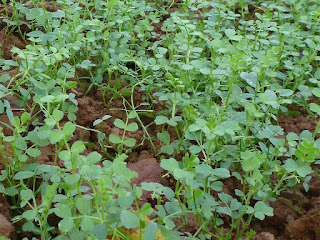Green Manure
Fancy growing your own compost? Simple. Just plant a green manure on your plot over winter and then feed it to your soil in the spring. We have noticed there are quite a few people doing just that this year. The choice of ‘manure’ varies from plot to plot with vetch (tares) and rye grass in evidence.
So, what is a green manure and how does it work? Basically, it is a fast-growing, hardy plant, usually sown in late summer to grow on the plot over the winter months. It works because the plants take up nutrients from the soil which might otherwise be washed away by heavy rain - such as we have been experiencing recently! Come early spring, the plants are cut down then either dug in or left on the surface where they decompose, releasing their nutrients back into the soil to be used by your tender new spring crops.
There are many benefits to growing a green manure - and not just that it is more attractive to look at than acres of black plastic sheeting. It adds a nutrient boost to the soil just when it’s needed; it suppresses weeds; it is a valuable ground cover for the soil over the winter, protecting it from the harshness of wind and rain; and it also provides shelter and food for over-wintering insects such as ground beetles.
There are a variety of green manures available, each of which brings different benefits to the soil. Semi-permanent green manures such as clover can also be grown and used as a ‘cut and come again’ crop for adding to the compost bin or using as mulch. Two things to remember when using a green manure are: (a) don’t let it go to seed by neglecting to cut it down, and (b) wait a few weeks after incorporating it before you start planting.
Although usually grown over winter, green manures can be sown at any time of the year - whenever you have a piece of soil with nothing growing in it for a couple of months. It doesn’t have to be a large area - it could be a small patch from which you have harvested. Whatever the situation, it is always better to keep growing on your soil rather than leaving it bare.
So, what is a green manure and how does it work? Basically, it is a fast-growing, hardy plant, usually sown in late summer to grow on the plot over the winter months. It works because the plants take up nutrients from the soil which might otherwise be washed away by heavy rain - such as we have been experiencing recently! Come early spring, the plants are cut down then either dug in or left on the surface where they decompose, releasing their nutrients back into the soil to be used by your tender new spring crops.
There are many benefits to growing a green manure - and not just that it is more attractive to look at than acres of black plastic sheeting. It adds a nutrient boost to the soil just when it’s needed; it suppresses weeds; it is a valuable ground cover for the soil over the winter, protecting it from the harshness of wind and rain; and it also provides shelter and food for over-wintering insects such as ground beetles.
There are a variety of green manures available, each of which brings different benefits to the soil. Semi-permanent green manures such as clover can also be grown and used as a ‘cut and come again’ crop for adding to the compost bin or using as mulch. Two things to remember when using a green manure are: (a) don’t let it go to seed by neglecting to cut it down, and (b) wait a few weeks after incorporating it before you start planting.
Although usually grown over winter, green manures can be sown at any time of the year - whenever you have a piece of soil with nothing growing in it for a couple of months. It doesn’t have to be a large area - it could be a small patch from which you have harvested. Whatever the situation, it is always better to keep growing on your soil rather than leaving it bare.
Submitted by Jane, Plot 9

Comments
Post a Comment